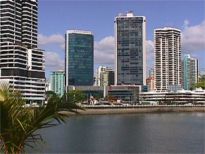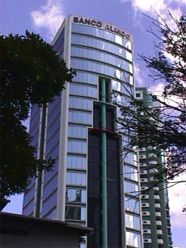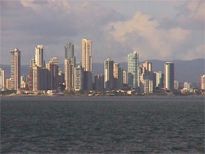 |
|
|
BACKGROUND
Panama is an international center for
banking, insurance, finance and shipping. Hundreds of
thousands of corporations from around the world are
established here, and enjoy Panamaís offshore tax-free
status and strict regulatory and confidentiality protection.
Some nine years ago, the
Panamanian government enacted a new law (Law #25 of June
12, 1995) establishing the formation of Panamanian Private Foundations.
The law is based on similar
Since the lawís enactment, thousands of Private Foundations
have been established and are in operation for clients
around the world.
The Panamanian law governing the establishment and
operation of Private Foundations is simple, yet complete.
It affords the Private Foundation the legal
security of established judicial and
confidentiality protection, while allowing
for complete and unrestricted action by the Foundationís
founders and beneficiaries.
CONCEPT
Panamanian Private Foundations
operate very much like a trust.
Normally, Foundations are endowed with a patrimony (liquid
or non-liquid assets) which is held in trust by the Foundation.
This endowment is thereinafter disbursed to the
beneficiaries as stipulated by the founder.
The founder can also be a beneficiary of the Foundation.
Once an asset (liquid or non-liquid) is endowed to the
Foundation, it becomes a part of the Foundationís
patrimony, and is legally separate and apart
from the founderís estate.
Third parties, such as governments or creditors, may not
attach liens against the Foundationís assets for personal
obligations of the founder, except in the case of
fraudulent or criminal activities.
Upon establishment of the Foundation, the founder (or the
founderís designate, heir or assign) exercises
complete control over the Foundation.
The Foundationís designation of beneficiaries, distribution
of patrimony, etc., can be changed as often as desired at
the discretion of the founder.
ADVANTAGES
Panamanian Private Foundations are proven legal entities
utilized by thousands of individuals and families around
the world to protect assets and to provide
for the planned, orderly transfer of patrimony
from one generation to another.
The Republic of Panama levies no taxes on
foreign income derived from The Foundation is duly registered in Panamaís Public Registry, thus ensuring its legal status. However, the Foundationís internal Regulations are privately held by its founder, thus ensuring its confidentiality. Assets placed in the Foundation become its sole property and are legally autonomous from the founderís estate. Thus, third parties, such as governments or litigants, cannot attach the Foundationís assets, except where the assets were derived from fraudulent or criminal activities.
INITIAL CAPITAL REQUIRE-MENTS & TAXES
The law requires that the initial capital pledged by the
Foundation shall be not less than $10,000.00.
This amount does
Panamanian Private Foundations enjoy very low filing
and annual fees.
As with Panamanian corporations, Foundationsí initial
registration fees depend on the original capital pledged by
the Foundation.
Thereafter, the Foundationís annual franchise fee is
$250.00, regardless of the amount of capital in the Foundation.
No taxes are levied on foundation assets or income, as long as that income is derived outside the Republic of Panama. Additionally, interest income on a Foundationís bank deposits within the Republic of Panama are also tax free.
STRUCTURE & FILING
A Foundation is formed via a Foundation Charter, which is a
legal instrument similar to articles of incorporation.
The Charter is required to state certain basic information
such as Foundation name, initial capital, Foundation
Council membersí names, Resident Agent in Panama, etc.*
The Charter is registered in Panamaís Public Registry and
is issued a ďPublic Registry CertificateĒ and is thus
established as a legally-recognized Private Foundation.
Thereafter, it can accept assets, open bank accounts, and
begin operations.
As stated above, the Charter must list members (minimum of
three) of the Foundation Council, who are appointed by the founder.
The Council serves as an active or passive
board of directors, at the discretion of the founder, who
can also serve on the Council.
Concurrent with the Charter, a confidential internal
document known as the Foundation Regulations is created.
The Regulations, which are similar to corporate bylaws,
normally name the beneficiaries and their rights to
Foundation assets, terms of disbursement, etc.*
The Regulations are not registered with the Public
Registry, and are not revealed to third parties
(govít. agencies, etc.) except at the discretion of
the founder.
OPERATIONS
The Foundation operates similar to a trust or holding company.
It cannot be used simply to operate a business or for
purely commercial enterprise.
Assets, both liquid (bank transfers, stocks, bonds, etc.)
and non-liquid (real estate, real property, titles, etc.)
are transferred into or deeded to the Foundation.
They then become the sole property of the Foundation.
The assets can and normally do generate income (interest on
deposits and bonds, stock dividends, real estate appreciation, etc.)
The founder names the beneficiaries (and can in fact be a
beneficiary), establishes the terms and conditions of asset
disbursement, and appoints Council members, outside
auditors, etc. via the internal Regulations.
The founder can change the
Disbursement and distribution of assets are made according
to the Regulations.
The Foundation is perpetual unless closure
provisions are specifically stated in the Regulations,
i.e., upon the founderís death and subsequent disbursement
of all assets.
USES
Foundations, like trusts, are used to protect assets and to
allow for the planned, orderly distribution of said assets
to beneficiaries.
These Foundations have been called ďthe perfect
living willĒ.
Foundations can contribute to other entities such as
charities, institutions, churches, etc., at the
behest of the founder.
Foundations can also be set up as retirement
annuities for the founder as beneficiary.
Others set up unfunded Foundations as a ready precaution
against potential contingent liabilities.
* see
Foundation Requirements Document |
|
|
|||||
 |
 |
 |
|||
 |
 |
 |
|||
| Home | |||||


 Foundation
assets, nor does it tax interest income generated from
monies deposited in Panamanian banks.
Foundation
assets, nor does it tax interest income generated from
monies deposited in Panamanian banks.
 not have to be paid in to the Foundation in advance.
not have to be paid in to the Foundation in advance.
 Regulations in whole or in part via amendments to the
Regulations, at the founderís sole discretion.
Regulations in whole or in part via amendments to the
Regulations, at the founderís sole discretion.
 Most Foundations are
set up as instruments for the programmed disbursement of
assets from one generation of family members to another.
Most Foundations are
set up as instruments for the programmed disbursement of
assets from one generation of family members to another.